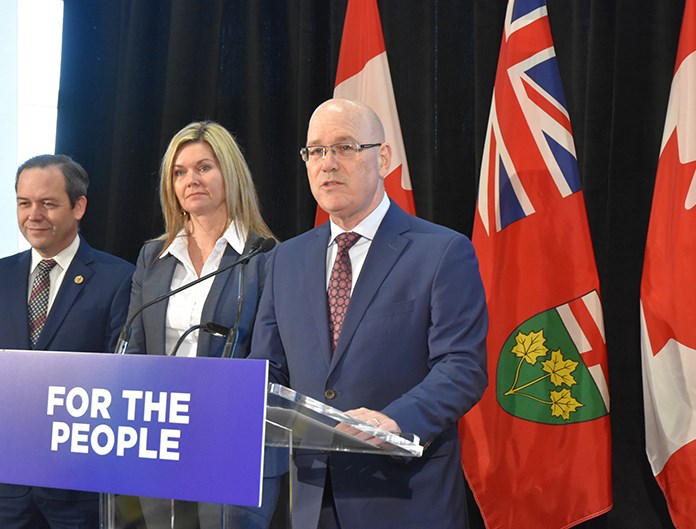Environmental groups and activists in the area are lauding a court ruling against the provincial government, but they’re skeptical about whether it will result in meaningful change.
Ecojustice, on behalf of Greenpeace Canada and Wilderness Committee, launched a lawsuit against the province, claiming the government broke the law by not consulting with the public before passing the omnibus Bill 197 — the COVID-19 Economic Recovery Act — within a matter of two weeks in July 2020.
“The law made major changes to the province’s Environmental Assessment Act, the Planning Act, and other laws essential for maintaining a clean and healthy environment for all Ontarians,” the groups stated in a news release.
“The Ford government did not consult with the public prior to passing Bill 197 into law. Under the province’s Environmental Bill of Rights, the people of Ontario have the right to be heard and consulted before any major changes are made to environmental laws,” they wrote. “The consequences of Bill 197’s legislative changes are now causing conflict in communities across Ontario — for example, in the government’s freer use of Minister’s Zoning Orders (MZOs) to greenlight controversial development projects.”
Months after Bill 197 became law, the province posted amendments to the Environmental Registry of Ontario for public comment.
It was too little, too late, the Ontario’s Divisional Court ruled in its decision this month, stating “an after-the-fact posting does not satisfy the requirements of the Environmental Bill of Rights, which is meant to give the public an opportunity to be consulted on certain types of proposals that could have a significant effect on the environment before such a proposal is enacted.”
The ruling also stated Minister of Municipal Affairs and Housing Steve Clark "acted unreasonably and unlawfully in failing to post the MZO proposal …”
“It’s the second time the province has failed to do so,” said Claire Malcolmson, executive director of the Rescue Lake Simcoe Coalition.
The first, she noted, was with the cancellation of cap-and-trade contracts.
“I find it hard to believe that there’s no one in the government who knew they had a duty to do that,” she said. “The government is breaking the law.”
The court’s ruling reaffirms “environmental organizations like ours have been extremely justified in questioning the appropriateness of MZOs,” Malcolmson said.
“The fact that they made this massive change to the legislation without public consultation shows that, in my opinion, the province is happy to override legislation.”
The province has defended its use of MZOs as a means to cut red tape, while it actually “cuts transparency completely and cuts consultation completely,” Malcolmson said.
She hopes the court’s decision will lead the government to reverse the changes that prompted the lawsuit.
“Do I think they’re going to? Absolutely not,” she said.
Mike Douglas feels the same way.
The Ramara Township resident, an ardent environmental activist and supporter of groups like the Rescue Lake Simcoe Coalition, hopes — but doesn’t expect — the decision will lead to changes in the way the province consults and issues MZOs.
“I hope they recognize that their four-year tenure is coming to an end and they start listening to people about our environment,” he said. “I hope they recognize that, but I don’t think that’s going to happen.”
He pointed to the province’s track record as a reason for his lack of optimism.
“It’s been one attack after another on our environmental protections in Ontario,” he said.
Village Media asked the Ministry of Municipal Affairs and Housing a number of questions, including whether it accepted the court’s decision, if it planned to walk back the legislative changes in question and if it intended to appeal the ruling. Those questions were not answered in a response from Clark’s office.
In a statement, spokesperson Zoë Knowles did not acknowledge the lawsuit or decision. She referred to Bill 197 as “an important tool in the province’s ongoing response to COVID-19 by introducing an enhanced Minister’s Zoning Order that cuts red tape and accelerates the development of essential projects that help us keep Ontarians safe.”
“This includes projects like health care facilities, long-term care homes and affordable housing outside of the Greenbelt,” she said.
“In fact, the enhanced zoning authority has allowed three health and long-term care facilities to be fast-tracked in the Greater Toronto Area, which are crucial to keeping Ontarians safe and healthy as part of the province’s ongoing response to COVID-19.”
That doesn’t justify the use of an MZO, issued in August, for the Mobility Orbit project in Innisfil, Malcolmson said.
“I would like someone to explain to me how 20,000 people in a cornfield between Alcona and Lefroy is a COVID recovery move,” she said.
Regarding the lack of consultation at the heart of the recent lawsuit, Knowles said the ministry was “forced to act quickly” because of the rapidly changing COVID-19 situation.
“The ministry consulted with the public after Bill 197 was implemented, and continues to do so, with a clear commitment to take the public’s input into consideration whenever an enhanced Minister’s Zoning Order is used,” she said.



